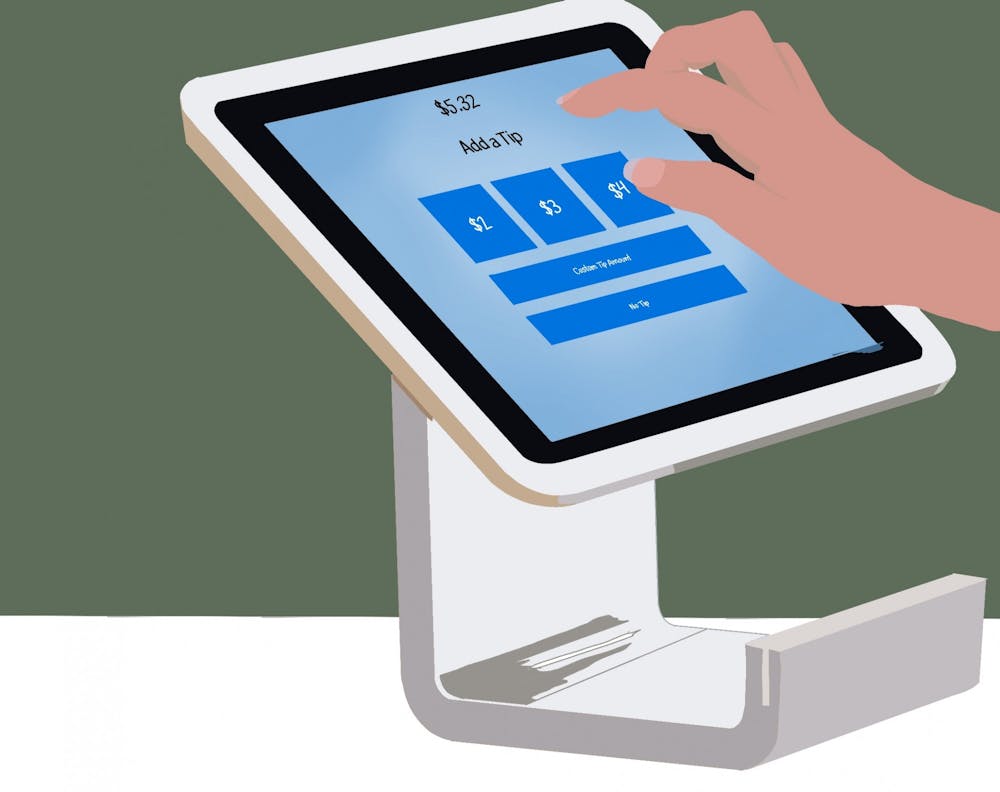Ever since the pandemic, iPad payments followed by the “would you like to leave a tip?” prompt have become the norm at retail and food services locations. For those with financial means, the decision to just pay an additional tip may be a no-brainer, but for others it may seem unnecessary or even economically burdensome. Regardless of how you feel about tipping, it is indisputable that there has been an increase in instances where tipping is now anticipated or requested in places where it was not customary before. While most places asking for electronic tips employ workers who make at least minimum wage, many restaurant workers rely on tips as a significant portion of their income. The rise in tipping outside of the restaurant industry points to companies’ unwillingness to raise wages, or offer more extensive employee benefits. Instead, tipping has become an easy way for companies to meet workers demands for higher wages without having to provide the funds internally, burdening consumers and promoting unsustainable wage earnings. As such, the government must guarantee both a living wage and social safety nets for all workers.
For context, workers who rely on tips are often at the greatest disadvantage for not being able to access employee benefits, and they do not always make minimum wage. Their pay can vary wildly from day to day — an unsustainable lifestyle that leaves workers vulnerable to exploitation. A worker’s pay should not be dependent on whether or not a customer enjoyed their service. A set hourly pay should be a guarantee. Attempts to dismantle the system have occurred, but the restaurant industry fought back, exempting these workers from making at least the federal minimum wage. A guaranteed living wage and access to social safety nets will positively impact all workers but especially those relying on tips.
I was inspired to write about this topic after reading an article which outlined one customer’s experience after going to a restaurant and seeing the phrase “employee health fee” as a separate 5 percent charge on her receipt, in addition to the tip. When the customer asked the hostess of the restaurant what the additional charge meant, she was told “that’s our health care.” This is problematic for several reasons. Under the Affordable Care Act, it is the employer’s responsibility to offer affordable health insurance to employees. If access to insurance is dependent on an additional fee, workers are left at the mercy of their customers, who should not be responsible for funding worker’s health insurance — especially if those customers cannot even provide that support for themselves.
Employee benefits have become a substitute for social safety nets, and under this system, people are not guaranteed essential services. Services like health insurance under our employer-sponsored work system are supposed to be an employee benefit, but as demonstrated in the story above, it is not a guarantee for all workers. Under the ACA, employers must set aside income for employee health insurance. However, because there are ranges of employment status from full-time to part-time to unemployed, not everyone is covered under the ACA. For example, many employers continue to refuse to insure part-time workers because there are no laws requiring that all companies insure these individuals. It is ridiculous that part-time workers are sometimes exempt from even the measly employee benefits that are legally mandated, much less for those who do not make minimum wage and rely on tips. This means some workers have to fund some of their own services like health insurance which can be difficult for low-wage earners.
Moreover, employee benefits cannot be a substitute for social safety nets because they are not comprehensive enough. Because there are so few social safety nets in this country, employers can make access to healthcare — as well as access to things like a 401K retirement plan and paid time off— seem like an incentive to work for a company rather than a given. These benefits include having access to social security, unemployment insurance, medical leave and access to health insurance. However, having only these required benefits leaves a lot to be desired. For example, employers are not required to offer retirement benefits, tuition assistance, or child care. Even the existing requirements such as making at least minimum wage is unsustainable for many across the country. This cycle of inefficient essential services is perpetuated because we as a society are ingrained to think access to social safety nets including healthcare are privileges and not rights.
So what is the solution to all of these systemic issues? Firstly, it should not be the consumer's responsibility to pick up the slack of an employer, especially if that employer makes billions of dollars a year. However, there is a difference between restaurant workers whose income is sustained by tips, and workers making at least the minimum wage asking for additional tips. Therefore, it should be up to you, the consumer, whether or not to tip at a coffee shop or wherever else you see that iPad payment question. However, it is also important to recognize that just making the minimum wage does not mean an income is liveable. Therefore, it is imperative that rather than relying on employers to provide social safety nets through a few employee benefits, the government must guarantee social safety nets and raise the outdated minimum wage. Finally, we as citizens must continue to support efforts to increase the standard of living for all workers.
Yssis Cano-Santiago is an Opinion Columnist who writes on Health, Technology and the Environment for The Cavalier Daily. She can be reached at opinion@cavalierdaily.com.
The opinions expressed in this column are not necessarily those of The Cavalier Daily. Columns represent the views of the authors alone.







